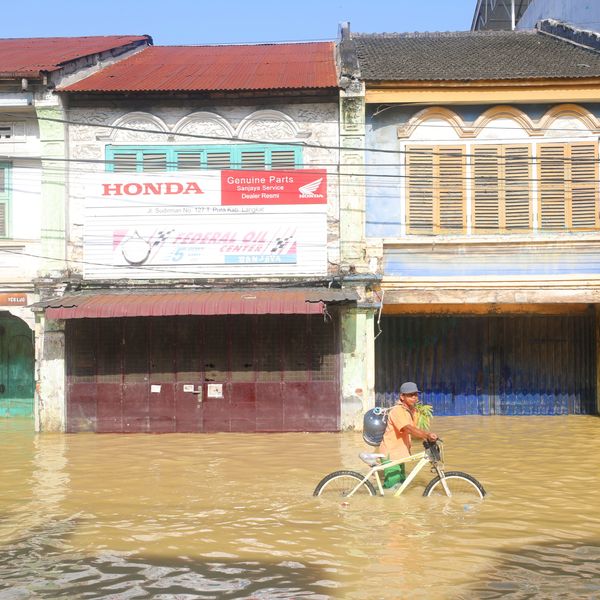
New Stanford research shows that higher temperatures increase suicide rates in the United States and Mexico. (Photo: iStockphoto/beer5020)
New Study Reveals Climate Change Could Prompt Tens of Thousands Additional Suicides in U.S. and Mexico by 2050
"A main hypothesis is that hotter temperatures have a direct effect on human emotion and impulsivity."
New research found a link between rising temperatures and suicide, indicating that unchecked climate change could lead to additional 9,000 to 40,000 suicides across the United States and Mexico by 2050.
The findings by researchers at Stanford and the University of California, Berkeley were published Monday in Nature Climate Change.
"We've been studying the effects of warming on conflict and violence for years, finding that people fight more when it's hot. Now we see that in addition to hurting others, some individuals hurt themselves. It appears that heat profoundly affects the human mind and how we decide to inflict harm," said Solomon Hsiang, study co-author and associate professor at theUniversity of California, Berkeley.
Though previous research found that suicides tend to peak during warmer months but the connection has remained poorly quantified. To gather research, the team analyzed temperature and suicide data across thousands of U.S. counties and Mexican municipalities spanning several decades. Additionally, the team examined the language in more than 600 million geotagged Twitter posts, and found that, "each additional 1 @C in monthly average temperatures increases the likelihood of depressive language in tweets--like "lonely," "trapped," or "suicidal"--by as much as 1.35 percent."
The research calculates that, "temperature increases by 2050 could increase suicide rates by 1.4 percent in the U.S. and 2.3 percent in Mexico. These effects are roughly as large in size as the influence of economic recessions (which increase the rate) or suicide prevention programs and gun restriction laws (which decrease the rate)."
"Hotter temperatures are clearly not the only, nor the most important, risk factor for suicide," emphasized Stanford economist Marshall Burke, who lead the study, "But our findings suggest that warming can have a surprisingly large impact on suicide risk, and this matters for both our understanding of mental health as well as for what we should expect as temperatures continue to warm."
Burke added, "We have the power to do something about this by slowing the future rise in temperatures."
The 24-hour hotline of the National Suicide Prevention Lifeline is 1-800-273-TALK (1-800-273-8255).
An Urgent Message From Our Co-Founder
Dear Common Dreams reader, The U.S. is on a fast track to authoritarianism like nothing I've ever seen. Meanwhile, corporate news outlets are utterly capitulating to Trump, twisting their coverage to avoid drawing his ire while lining up to stuff cash in his pockets. That's why I believe that Common Dreams is doing the best and most consequential reporting that we've ever done. Our small but mighty team is a progressive reporting powerhouse, covering the news every day that the corporate media never will. Our mission has always been simple: To inform. To inspire. And to ignite change for the common good. Now here's the key piece that I want all our readers to understand: None of this would be possible without your financial support. That's not just some fundraising cliche. It's the absolute and literal truth. We don't accept corporate advertising and never will. We don't have a paywall because we don't think people should be blocked from critical news based on their ability to pay. Everything we do is funded by the donations of readers like you. Will you donate now to help power the nonprofit, independent reporting of Common Dreams? Thank you for being a vital member of our community. Together, we can keep independent journalism alive when it’s needed most. - Craig Brown, Co-founder |
New research found a link between rising temperatures and suicide, indicating that unchecked climate change could lead to additional 9,000 to 40,000 suicides across the United States and Mexico by 2050.
The findings by researchers at Stanford and the University of California, Berkeley were published Monday in Nature Climate Change.
"We've been studying the effects of warming on conflict and violence for years, finding that people fight more when it's hot. Now we see that in addition to hurting others, some individuals hurt themselves. It appears that heat profoundly affects the human mind and how we decide to inflict harm," said Solomon Hsiang, study co-author and associate professor at theUniversity of California, Berkeley.
Though previous research found that suicides tend to peak during warmer months but the connection has remained poorly quantified. To gather research, the team analyzed temperature and suicide data across thousands of U.S. counties and Mexican municipalities spanning several decades. Additionally, the team examined the language in more than 600 million geotagged Twitter posts, and found that, "each additional 1 @C in monthly average temperatures increases the likelihood of depressive language in tweets--like "lonely," "trapped," or "suicidal"--by as much as 1.35 percent."
The research calculates that, "temperature increases by 2050 could increase suicide rates by 1.4 percent in the U.S. and 2.3 percent in Mexico. These effects are roughly as large in size as the influence of economic recessions (which increase the rate) or suicide prevention programs and gun restriction laws (which decrease the rate)."
"Hotter temperatures are clearly not the only, nor the most important, risk factor for suicide," emphasized Stanford economist Marshall Burke, who lead the study, "But our findings suggest that warming can have a surprisingly large impact on suicide risk, and this matters for both our understanding of mental health as well as for what we should expect as temperatures continue to warm."
Burke added, "We have the power to do something about this by slowing the future rise in temperatures."
The 24-hour hotline of the National Suicide Prevention Lifeline is 1-800-273-TALK (1-800-273-8255).
New research found a link between rising temperatures and suicide, indicating that unchecked climate change could lead to additional 9,000 to 40,000 suicides across the United States and Mexico by 2050.
The findings by researchers at Stanford and the University of California, Berkeley were published Monday in Nature Climate Change.
"We've been studying the effects of warming on conflict and violence for years, finding that people fight more when it's hot. Now we see that in addition to hurting others, some individuals hurt themselves. It appears that heat profoundly affects the human mind and how we decide to inflict harm," said Solomon Hsiang, study co-author and associate professor at theUniversity of California, Berkeley.
Though previous research found that suicides tend to peak during warmer months but the connection has remained poorly quantified. To gather research, the team analyzed temperature and suicide data across thousands of U.S. counties and Mexican municipalities spanning several decades. Additionally, the team examined the language in more than 600 million geotagged Twitter posts, and found that, "each additional 1 @C in monthly average temperatures increases the likelihood of depressive language in tweets--like "lonely," "trapped," or "suicidal"--by as much as 1.35 percent."
The research calculates that, "temperature increases by 2050 could increase suicide rates by 1.4 percent in the U.S. and 2.3 percent in Mexico. These effects are roughly as large in size as the influence of economic recessions (which increase the rate) or suicide prevention programs and gun restriction laws (which decrease the rate)."
"Hotter temperatures are clearly not the only, nor the most important, risk factor for suicide," emphasized Stanford economist Marshall Burke, who lead the study, "But our findings suggest that warming can have a surprisingly large impact on suicide risk, and this matters for both our understanding of mental health as well as for what we should expect as temperatures continue to warm."
Burke added, "We have the power to do something about this by slowing the future rise in temperatures."
The 24-hour hotline of the National Suicide Prevention Lifeline is 1-800-273-TALK (1-800-273-8255).

